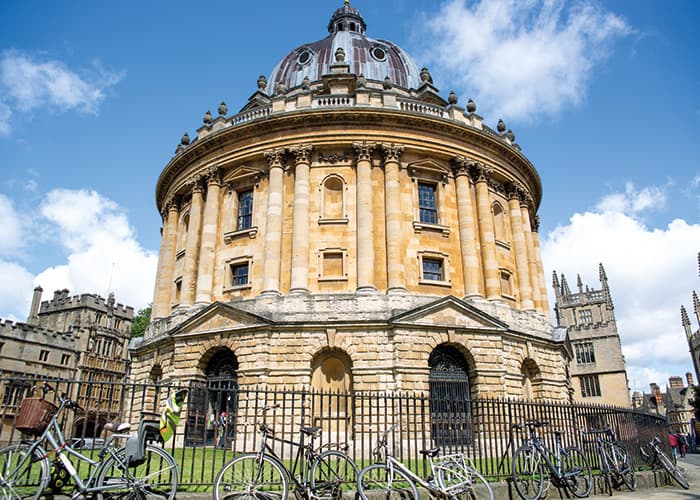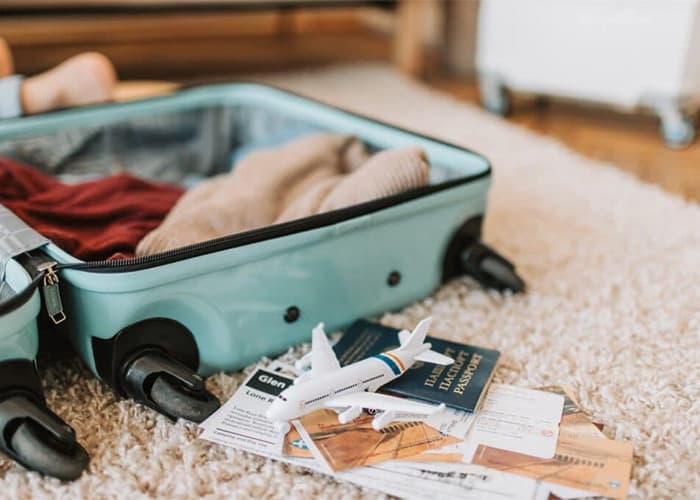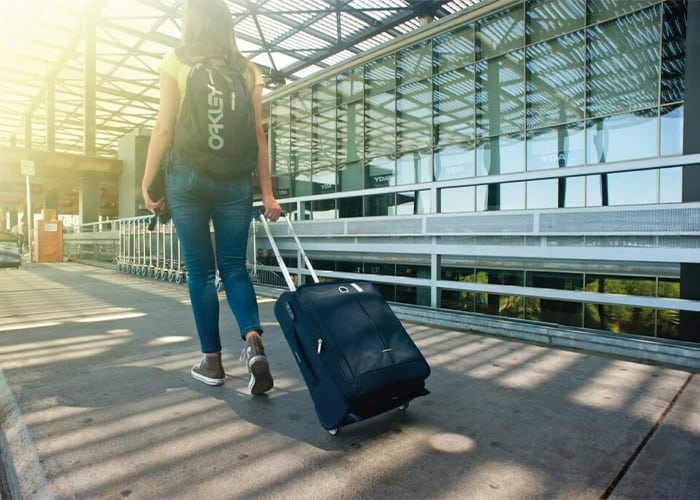Summer Boarding Courses
Get set for summer! Helpful tick-list of what to pack before you travel to the UK this summer ????

Whether it’s your first time away from home or you’re a seasoned traveller, coming to the UK to attend a summer school can be daunting. Once you’ve confirmed your place, got your visa, and booked your travel, the final thing to think about is packing. It can seem like there’s a lot to consider when packing for summer school abroad, especially if you haven’t been to the UK before, but don’t worry! With a bit of planning, you can get prepared ahead of the summer and make sure you pack accordingly to get the most out of your summer school experience. To help you do that, we’ve put together this handy guide to clarify exactly what to bring, so that you can start getting organised and excited about summer school!
TRAVEL PREPARATION

If you’re travelling to the UK from abroad, you will need to be prepared with all the necessary documents to enter the UK. If you are travelling with both a carry-on and a checked bag then make sure that all your important documents are in your carry-on, as you will need to show them at the UK border before you collect your checked bag.
Valid passport – make sure that your passport is valid for the entire time you will be in the UK. If you are travelling to another country after the UK, then make sure to check their passport requirements too, as some countries require that you have at least six months left on your passport.
Visa – you will need your visa to enter the UK so make sure you have this handy!
Travel insurance – here at Summer Boarding Courses we provide travel insurance as part of our package. Remember to print out the policy document before you travel to the UK, and keep it with your essential documents.
Medical documents and medication – if you have any medical conditions, then remember to bring any necessary documents and medication with you.
PACKING ESSENTIALS

Once you’ve sorted your essential documents, it’s just as important to think about what to bring for the duration of your stay in the UK that will make your summer school experience as enjoyable as possible! Remember that life in the UK might be quite different from what you’re used to at home, especially when it comes to the weather. Although summer can often be hot and sunny, it is also common to experience rain even during the summer months. This makes it especially important to pack a range of clothing so that you will be prepared whatever the weather.
Sun protection
Although Britain isn’t known for its year-round good weather, it can get very hot and sunny here in summer – the average temperature in July and August is around 20 degrees, but it can sometimes reach up to 30 degrees! You will have the chance to participate in various outdoor activities throughout your stay at a Summer Boarding Courses school or college, depending on which location you are going to – from beach days to outdoor games, and of course our excursion programme. To make the most of the great British summer while staying safe, protection like sun cream, sunglasses, and a sun hat are essential.
Waterproof coat
On the flip side, Britain does sometimes still experience rain in summer – if this is the case then we will move inside where possible, but there may still be some time outdoors on the excursion programme. One important thing to remember for life in the UK is that there is no such thing as bad weather, only bad clothing! Make sure to bring a waterproof coat and you will be prepared no matter the weather.
Comfortable clothes and shoes
Part of the fun of summer school is all the extracurricular activities you will get to participate in, whether this is sports, yoga, challenge days, capture the flag, or more. Make sure to bring clothes such as t-shirts and jeans or shorts so that you will be comfortable while joining in all the fun!
Party clothes
Here at Summer Boarding Courses we love to celebrate, whether this is discos at our schools or graduations at our colleges. These are really special events where students come together to have a fun evening and consolidate the friendships they have formed with other students from all over the world! It’s always nice to dress up for these events, so bring some party clothes or disco wear with you.
Adaptor
Remember that the chargers you normally use at home may not be compatible with plugs in Britain. Here in the UK we use 3-pin plugs and chargers with voltage 230V. Make sure to bring an adaptor with you so that you can continue to charge your devices as normal while at summer school.
Toiletries
It’s a good idea to bring any toiletries you would normally use such as a toothbrush, toothpaste, shampoo, conditioner and shower gel, and you are also expected to bring your own towel. Travel size bottles are a good idea in order to save space in your suitcase – even if you’re coming for one of our longer courses, you can always purchase more toiletries once in the UK, so there’s no need to bring 4 weeks’ worth of shower gel when you arrive. If you prefer to bring full-size toiletries, remember that all liquids over 100ml must be packed in your checked bag if you are flying.
Small rucksack
Make sure to bring a small rucksack or other bag with you to take on excursions – this will be handy for carrying a water bottle, extra layers, and for storing any souvenirs you buy while out and about.
Pocket money
All meals, activities, and excursions are included in the programme fee, so pocket money is only needed to buy tuck shop snacks and souvenirs.
Journal and pens
Summer school will be an experience to remember forever, so why not commemorate it with a scrapbook or journal? You will have downtime at various points throughout your stay such as house nights or wellbeing evenings, and it might be a nice idea to bring a journal so that you can record what you have been doing and how you are feeling throughout this experience!
Cultural items from your home country
Every year we welcome students from all around the world, and over time we have had 151 nationalities represented across our schools and colleges! We encourage students to share and celebrate the culture of their home country, so we often host international nights where students can share whatever they would like to from home. Feel free to bring along an item of clothing or anything else to represent your home country, just make sure not to bring anything that is valuable or precious to you.
USEFUL TIPS

If you have never visited the UK before, then you may find some of our local customs unfamiliar! Here are some local customs to keep in mind, as well as important information to use in an emergency.
Greetings
Brits can be very friendly and welcoming, but in general they are not touchy-feely with people they don’t know. When greeting people, hugs and kisses are usually reserved for close friends and family. In a formal situation, Brits would shake hands with the person they are meeting, but in most social situations an informal “hello” is best!
Meal times
In the UK we generally have three mealtimes – breakfast, lunch, and dinner. Breakfast is the first meal of the day and normally consists of cereal, toast, or fruit, although on weekends some Brits may eat a traditional full English breakfast, which can include bacon, eggs, tomatoes, sausages, baked beans, and mushrooms.
Lunch is usually eaten between 12 and 2pm and is normally a smaller meal as well. Common lunch foods include sandwiches, soup, and salads, although on a Sunday some Brits may eat a Sunday roast. This consists of roasted meat with gravy, roast potatoes, vegetables, and Yorkshire puddings – don’t be fooled, despite the name these are not sweet!
The final meal of the day is often called dinner, but may also be referred to as “supper” or “tea”. It is normally the main meal of the day and may be eaten between 5:30 and 8pm. A traditional British dinner would often consist of meat, vegetables, and potatoes or pasta, but these days Brits enjoy cuisine from all over the world, so the evening meal could be anything from Thai to Mexican to Indian.
Water
In the UK the tap water is very safe to drink, so most Brits just drink the water from their taps. It is unusual to drink bottled water in the UK as there is no need to.
Queuing
People in the UK are very polite and are renowned for queueing! If you are out and about on an excursion then you may notice Brits queueing for cashiers, public transport, and more. It is polite to join the back of the queue and wait your turn.
Saying sorry
If you haven’t been to the UK before then you might be surprised at how often you hear the word “sorry”! British people tend to say sorry as a reflex – if someone bumps into you, it is common to say sorry even if it is their fault! Many British people would even say sorry if they didn’t actually touch the other person but had come close to bumping into them. This isn’t really an expression of guilt or remorse, but simply a punctuation mark in daily British vocabulary.
Driving on the left
One third of countries in the world drive on the left, and the UK is one of them. This is important to keep in mind when out and about on excursions – you will need to look right, left, and then right again before you cross the road.
Public transport
Most cities in the UK have good public transport systems using buses, although this is less common in the countryside. You can either download an app and buy your ticket online, which you scan when you get on the bus, or you can pay the driver by contactless card or cash when you get on.
The front of the bus normally has priority seats for elderly, disabled, or pregnant people. It is ok to sit in these seats, but you should move if somebody who needs to sit down gets on the bus. If there are a lot of empty seats on the bus, it is generally considered rude to sit down next to somebody who you don’t know. It is acceptable to stand up on a bus as well.
If you want to get off the bus at the next stop, simply press one of the “stop” buttons located around the bus. It is polite to say thank you to the driver as you are getting off the bus.
Emergencies
We hope that you will not encounter any emergencies during your time in the UK, but it is always good to be prepared. If you need help in an emergency situation then you should dial 999. You can then ask for fire, ambulance, or police services.
WE LOOK FORWARD TO SEEING YOU SOON!
Now that you have learned more about what to bring to the UK for your Summer Boarding Courses experience, as well as some useful tips for life in the UK, we hope you are getting excited about your trip! Remember to plan ahead, bring weather-appropriate and comfortable clothes, and you will be all set for a summer experience that you will remember forever. If you have any further questions about what to bring or your stay in the UK then please don’t hesitate to get in touch. We look forward to welcoming you to a Summer Boarding Courses school soon!